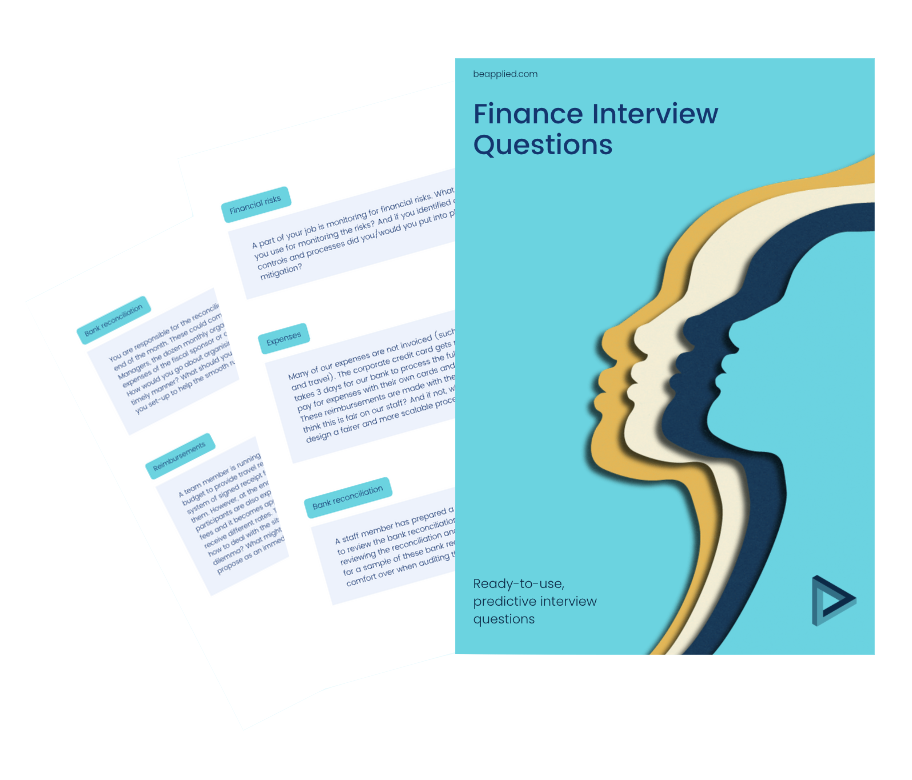Finance Interview Questions

About this role
In most organisations, the Finance Department is responsible for maintain financial health - accounting, planning expenditure and ensuring invoiced are paid.
Finance responsibilities
- Accounting
- Forecasting and budgeting
- Conduct risk management
- Managing cash flow
- Ensuring compliance with with financial regulations
What skills should you be looking for?
A part of your job is monitoring for financial risks. What process would you use for monitoring the risks? And if you identified a risk, what controls and processes did you/would you put into place for mitigation?
While performing the bank reconciliation, you find several unknown transactions, with no pre-existing supporting documentation in the finance system. What steps would you take to reconcile these unknown transactions?
For the following 2 scenarios, please identify and describe the accounting treatment you’d recommend, and why:
1) As part of month end close, you’ve been asked to process a bill for £18,000 related to an annual contract for a new piece of software
2) As part of month-end close, you’ve received email confirmation that an existing customer will be renewing their annual subscription, but has yet to sign their contract
A salesperson has submitted a £220 expense claim (with no supporting documentation, other than a print screen of their credit card statement), for a restaurant bill they incurred while taking out a lead to dinner, to discuss the possibility of them becoming a customer.
The policy is very clear on this matter - client entertainment costs greater than £50 need to be signed off by the Head of Sales PRIOR to any of the costs being incurred (as none of these are ever charged to the customer’s account), and is only applicable to existing customers.
How would you go about addressing this matter?
It's been a busy week and it's now just after lunch time on Friday afternoon. You have 3 things remaining on your “To do” list:
1. Revenue Reconciliation – you’re 1 working day away from month end close, when you find that 3 of the renewals you’re processing journals for, don’t have signed contracts in place, and you need to confirm their status with the Account Manager.
2. Accounts Payable – the VP of Marketing has just sent over 2 urgent, overdue bills (that would require sign off from the CEO given their materiality) that she has promised the vendors will be settled by the end of the day, in order to enable the project to kick off on Monday next week.
3. Accounts Receivable – earlier in the day, a new customer sent over a complicated “New Vendor Setup” form that needs to be completed and sent over to them by the end of the day, in order to enable their Finance teams to pay the invoice you sent earlier in the week.
Imagine you only have time to do 1 of these tasks, which 1 do you choose to do and why?
What are structured interview questions?
Structured questions (or work samples) are highly predictive, job-specific questions designed to simulate parts of a job.
Structured work sample questions are the most predictive form of assessment you can use. Why? Because they directly test for skills by asking candidates to think as if they were already in the job.
Diversity
Testing for skills instead of just experience makes interviews a more inclusive process. 60%+ of candidates hired through our process would've been missed using CVs/traditional interviews - most of whom are from underrepresented groups.
Accuracy
By simulating tasks that would realistically occur in the role, you can see how candidates would think and work should they get the job.What could be more predictive than having candidates do small parts of the job before actually getting it?
Candidate experience
Candidates genuinely enjoy being given a chance to showcase their ability - this is why we have a 9/10 average candidate experience rating (including unsuccessful candidates).

Decide on the skills you’re looking for
Choose 6-8 core skills required for success in the role. These can be a mix of hard, technical skills as well as soft skills and general working characteristics.You could also include one or two of your organisation's most relevant values.
Think of scenarios that would test these skills
Next, come up with either everyday tasks or rarer, more challenging scenarios that would test some of these skills. They can be day-to-day duties, bigger projects or specific dilemmas that a candidate may realistically face. Should they get the job.
Pose scenarios hypothetically to create your questions
Instead of your typical ‘tell me a time when’ questions, ask candidates what they would do if faced with a given scenario.It's not that experience doesn't have any value… it's just more predictive to test directly for skills, without making assumptions based on background.
Give yourself scoring criteria
Want to make more data-driven hiring decisions? Score candidates against set criteria.We’d recommend starting out with a simple 1-5 star scale and a few bullet points noting what a good, mediocre and bad answer might include.

Use review panels
Having team members join your interviews will result in fairer, more accurate scores.Three is the magic number - you’ll start seeing diminishing return after that

.svg)